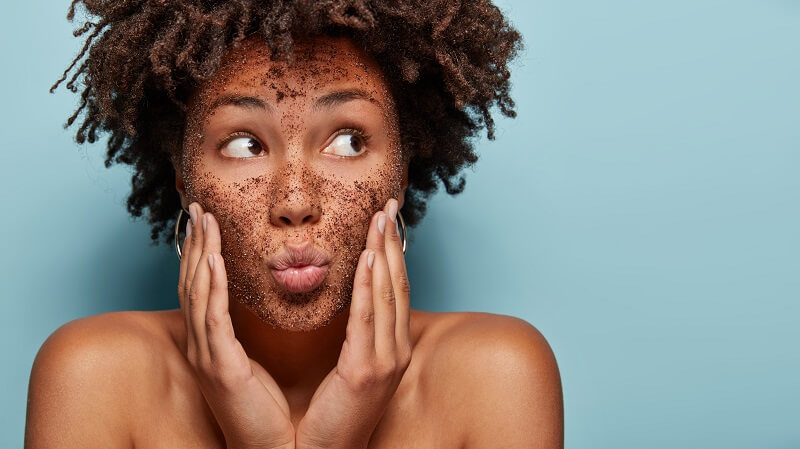Scrubs are physical exfoliants that remove dead skin cells and dirt buildup from the skin’s surface. Body and facial scrubs are two different categories of products, and each scrub comes with a label that says whether it is for body or facial use.
Knowing this, can you still use these products interchangeably?
Read on to learn if you can use a body scrub on your face when you’re out of facial exfoliator and what happens when you do.

Can You Use a Body Scrub on Your Face: 3 Main Things to Consider
Many people have used and will continue to use body scrubs on their faces for different reasons. However, this is not sound skincare practice.
Consider these three important arguments against using a body scrub for the face.
1. Sensitive Skin
Facial skin is more sensitive than the skin on the rest of the body. Body scrubs are made for thicker, tougher skin, such as the skin on the knees and elbows. If used on the face, body scrubs may cause:
- Irritation
- Scratches
- Dryness
- Redness
- Itchiness
- Tingling
- Breakouts
How your body reacts to a body scrub also depends on your facial skin type. If you have oily, resistant skin, you might not have an adverse reaction to the body scrub. However, dry, sensitive, and acne-prone skin needs a gentle facial exfoliator.
2. Different Ingredients
Body scrubs have a thicker consistency, larger particles, and a higher concentration of acids than facial scrubs. These ingredients may be too aggressive for facial skin. Some common components in body scrubs that are too abrasive or irritating for the face include sea salt, sugar, coffee, oatmeal, and perfume.
Facial scrubs often include moisturizing and soothing ingredients like aloe vera, cucumber, coconut milk, olive oil, almond oil, etc.
3. Different Blend of Oils
Body and facial scrubs often use the same oils, but their formulas usually incorporate different blends and concentrations.
Body skin is usually much drier than facial skin, so it tolerates higher concentrations of oils. Using body products on the face can cause clogged pores and outbreaks, especially on oily skin.
Good Facial Scrub Alternatives
There are other ways to exfoliate the face besides facial scrubs. Below are common scrub alternatives.
Chemical Exfoliating Cleansers
Chemical exfoliants use acids to remove impurities from the skin’s surface and prepare the skin for nourishing and protective skincare products. The main ingredients in chemical exfoliating cleansers include alpha-hydroxy acids (AHA) and beta-hydroxy acids (BHA).
Mechanical Exfoliants
Mechanical exfoliants include face sponges, washcloths, and brushes that massage the face and remove impurities. They are best used for oily and combination skin.
Scrub Masks
Scrub masks have the same function as facial scrubs – to cleanse and exfoliate the skin. However, they usually have additional ingredients such as clay, which absorbs toxins and impurities from deeper skin layers. They stay on the face for about 15 minutes, unlike facial scrubs that are washed off after 20-30 seconds.
DIY Scrubs
People often use food products they have at home to prepare a scrub. Some of the best ingredients for DIY face scrubs include finely ground oatmeal, cinnamon, honey, milk, yogurt, bananas, pineapples, and more.
Sugar Scrubs
Although valued as an exfoliant, sugar is rarely used in facial scrubs because it can irritate the sensitive skin on the face. However, when finely ground, sugar can be very effective at removing impurities and brightening the face.
Conclusion
Exfoliation is an essential step in skin care. Regular removal of dead cells, sebum, and dirt from the skin’s surface helps maintain a glowing complexion.
Scrubs are among the best skincare products for cleansing, but you need to use products that will be gentle to the sensitive skin on your face. Make sure to always use scrubs formulated specifically for facial use.


